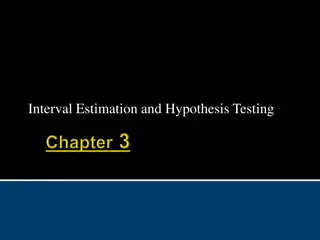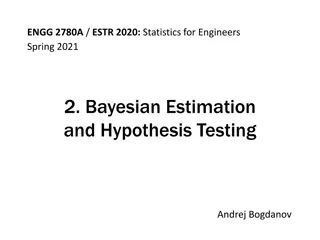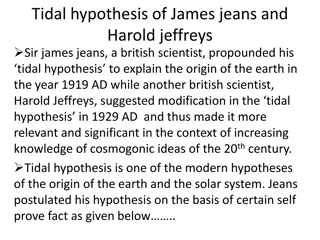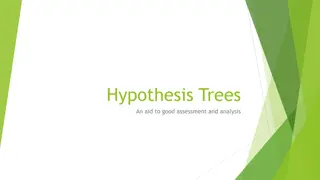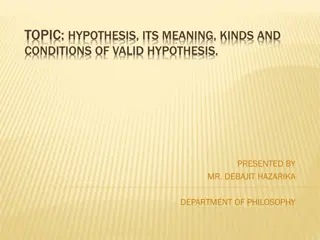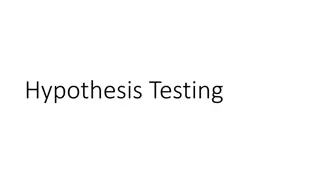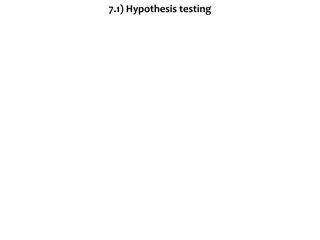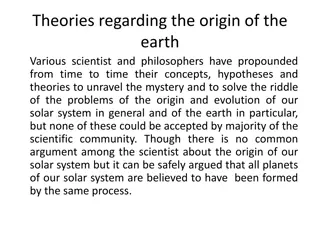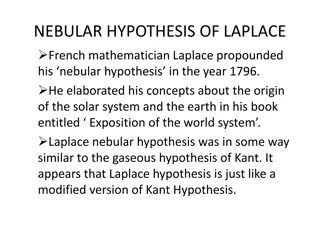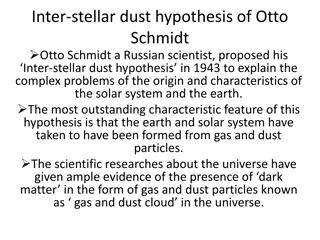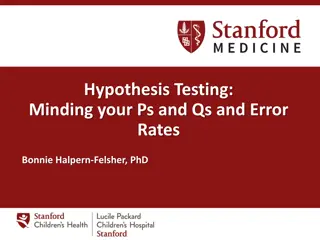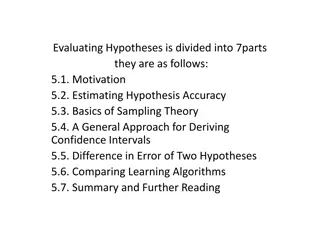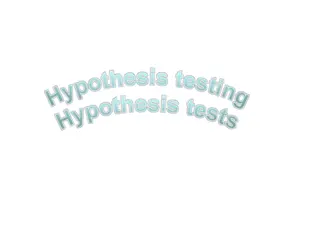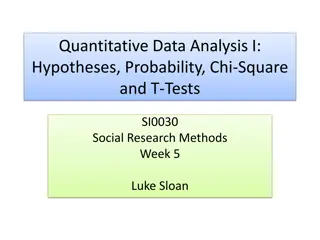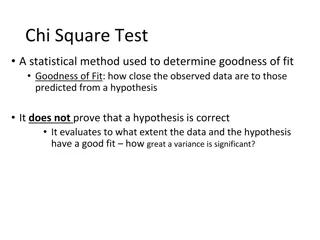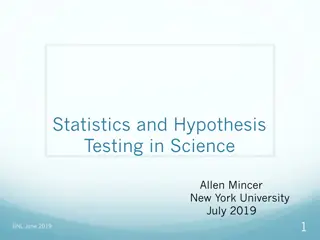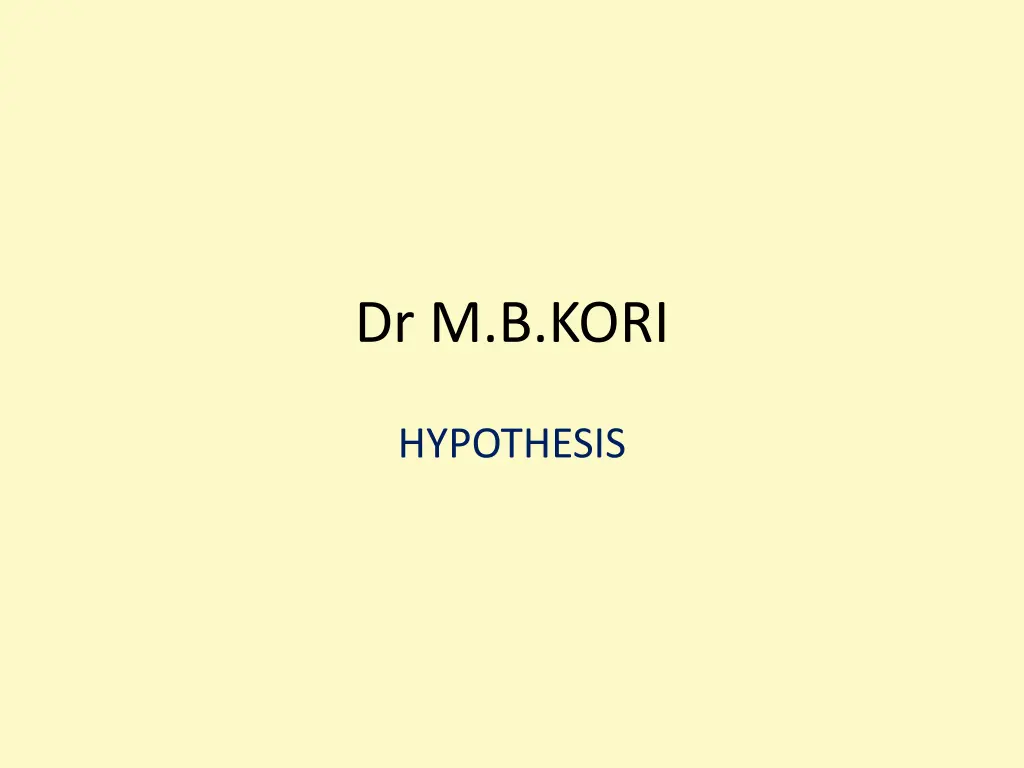
Understanding the Significance of Hypothesis in Research
Learn about the importance of hypotheses in research, how they guide investigations, and their role in advancing knowledge. Explore definitions, nature, testing, and the value of hypotheses in scientific inquiry.
Download Presentation

Please find below an Image/Link to download the presentation.
The content on the website is provided AS IS for your information and personal use only. It may not be sold, licensed, or shared on other websites without obtaining consent from the author. If you encounter any issues during the download, it is possible that the publisher has removed the file from their server.
You are allowed to download the files provided on this website for personal or commercial use, subject to the condition that they are used lawfully. All files are the property of their respective owners.
The content on the website is provided AS IS for your information and personal use only. It may not be sold, licensed, or shared on other websites without obtaining consent from the author.
E N D
Presentation Transcript
Dr M.B.KORI HYPOTHESIS
A hypothesis can be defined as a tentative explanation of the research problem, a possible outcome of the research, or an educated guess about the research outcome . Goode and Hatt have defined it as a proposition which can be put to test to determine its validity . Hypotheses are single tentative guesses, good hunches assumed for use in devising theory or planning experiments intended to be given a direct experimental test when possible .
According to Lundberg, A hypothesis is a tentative generalisation, the validity of which remains to be tested. In its most elementary stage, the hypothesis may be any hunch, guess, imaginative idea, which becomes the basis for action or investigation . Hence, a hypothesis is a hunch, assumption, suspicion, assertion or an idea about a phenomenon, relationship or situation, the reality or truth of which you do not know.
Nature of Hypothesis The hypothesis is a clear statement of what is intended to be investigated. It should be specified before research is conducted and openly stated in reporting the results. This allows to: Identify the research objectives. Identify the key abstract concepts involved in the research. Identify its relationship to both the problem statement and the literature review. A problem cannot be scientifically solved unless it is reduced to hypothesis form.
It is a powerful tool of advancement of knowledge, consistent with existing knowledge and conducive to further enquiry. It can be tested verifiable or falsifiable. Hypotheses are not moral or ethical questions. It is neither too specific nor to general. It is a prediction of consequences. It is considered valuable even if proven false.
Importance of Hypothesis Hypothesis though an important part of research may not be required in all types of research. The research which are based on fact finding (historical or descriptive research) do not need hypothesis. Hillway also says that When fact- finding alone is the aim of the study, a hypothesis is not required . Whenever possible, a hypothesis is recommended for all major studies to explain observed facts, conditions or behaviour and to serve as a guide in the research process.
Hypothesis facilitates the extension of knowledge in an area. They provide tentative explanations of facts and phenomena, and can be tested and validated. It sensitizes the investigator to certain aspects of the situations which are relevant from the standpoint of the problem in hand. Hypothesis provide the researcher with rational statements, consisting of elements expressed in a logical order of relationships which seeks to describe or to explain conditions or events, that have yet not been confirmed by facts. The hypothesis enables the researcher to relate logically known facts to intelligent guesses about unknown conditions. It is a guide to the thinking process and the process of discovery.
Hypothesis provides direction to the research. It defines what is relevant and what is irrelevant. The hypothesis tells the researcher what he needs to do and find out in his study. Thus it prevents the review of irrelevant literature and provides a basis for selecting the sample and the research procedure to be used in the study. Hypothesis implies the statistical techniques needed in the analysis of data, and the relationship between the variables to be tested. It also helps to delimit his study in scope so that it does not become broad or unwieldy.
Hypothesis provides the basis for reporting the conclusion of the study. It serves as a framework for drawing conclusions. In other word, we can say that it provides the outline for setting conclusions in a meaningful way. So, Hypothesis has a very important place in research although it occupies a very small place in the body of a thesis.
Sources of Hypothesis: A good hypothesis can only be derived from experience in research. Though hypothesis should precede the collection of data, but some degree of data collection, literature review or a pilot study will help in the development and gradual refinement of the hypothesis. A researcher should have quality of an alert mind to derive a hypothesis and quality of critical mind of rejecting faulty hypothesis.
The following sources can help the researcher in coming up with a good hypothesis: Review of literature. Discussion with the experts in the given field to understand the problem, its origin and objectives in seeking a solution. Intuition of the researcher also sometimes helps in forming a good hypothesis. Previous empirical studies done on the given area
The Types of Hypothesis Research Hypothesis The Research Hypothesis could be understood in terms of Simple Research hypothesis and Complex Research Hypothesis. A simple research hypothesis predicts the relationship between a single independent variable and a single dependent variable. A Complex hypothesis predicts the relationship between two or more independent variables and two or more dependent variables. A research hypothesis must be stated in a testable form for its proper evaluation and it should indicate a relationship between variables in clear, concise and understandable language
Ex- For Research Hypothesis "Students who eat breakfast will perform better on a math exam than students who do not eat breakfast. Complex hypothesis: "Students who experience test anxiety before an English exam will get lower scores than students who do not experience test anxiety."
Research Hypothesis are classified as being directional or non-directional. Directional Hypotheses: These are usually derived from theory. They may imply that the researcher is intellectually committed to a particular outcome. They specify the expected direction of the relationship between variables i.e. the researcher predicts not only the existence of a relationship but also its nature.
For example- 'studying improves exam marks', 'women are better drivers than men'. With a correlational study, a directional hypothesis states that there is a positive (or negative) correlation between two variables.
Non-directional Hypotheses: Used when there is little or no theory, or when findings of previous studies are contradictory. They may imply impartiality. Do not stipulate the direction of the relationship. For example, everyone knows the more you revise, the better you do in exams but a hypothesis may say 'There is a difference in the exam results between those who revise a lot and those who do not revise' and this is, of course, a non-directional hypothesis.
Associative and causal Hypotheses: Associative Hypothesis: Propose relationships between variables - when one variable changes, the other changes. Do not indicate cause and effect. Causal Hypothesis: Propose a cause and effect interaction between two or more variables. The independent variable is manipulated to cause effect on the dependent variable. The dependent variable is measured to examine the effect created by the independent variable.
For example, a rise in the number of patients in a particular hospital does not mean that hospital is responsible for making the people sick, they might get sick due to the season change or the other factors. For example, a causal hypothesis we might want to seek evidence for the idea that inhaling chalk dust causes asthma. Cause: A cause is something that is thought to bring about something else. For example, we might think that inhaling chalk dust causes asthma.
Statistical Hypothesis: To test whether the data support or refute the research hypothesis, it needs to be translated into a statistical hypothesis. It is given in statistical terms. In the context of inferential statistics, it is statement about one or more parameters that are measures of the population under study. Inferential statistics is used for drawing conclusions about population values.
To use inferential statistics, we need to translate the research hypothesis into a testable form, which is called the null hypothesis. A testable hypothesis contains variables that are measurable or able to be 8 manipulated. They need to predict a relationship that can be 'supported' or 'not supported' based on data collection and analysis.
Null Hypothesis These are used when the researcher believes there is no relationship between two variables or when there is inadequate theoretical or empirical information to state a research hypothesis. The null hypothesis represents a theory that has been put forward, either because it is believed to be true or because it is to be used as a basis for argument, but has not been proved. Has serious outcome if incorrect decision is made. Designated by: Ho or Hn.
Null hypotheses can be: simple or complex associative or causal
The Alternative Hypothesis : The alternative hypothesis is a statement of what a hypothesis test is set up to establish. Designated by: H1 or Ha. It is opposite of Null Hypothesis. It is only reached if Ha is rejected. Frequently alternative is actual desired conclusion of the researcher. We give special consideration to the null hypothesis. This is due to the fact that the null hypothesis relates to the statement being tested, whereas the alternative hypothesis relates to the statement to be accepted if when the null is rejected.
Null Hypothesis: H0: There is no relationship between height and shoe size. Alternative Hypothesis: Ha: There is a positive relationship between height and shoe size.
The final conclusion, once the test has been carried out, is always given in terms of the null hypothesis. We either 'reject Ho in favour of Ha' or 'do not reject Ho'; we never conclude 'reject Ha', or even 'accept Ha'. If we conclude 'do not reject Ho', this does not necessarily mean that the null hypothesis is true, it only suggests that there is not sufficient evidence against Ho in favour of Ha; rejecting the null hypothesis then, suggests that the alternative hypothesis may be true
. For example: Ha= the males visited cinema more than females. Ho= the males and females do not differ in respect of the frequency of seeing cinema. So, Alternative hypothesis is usually the one which one wishes to prove and the Null hypothesis is the one which one wishes to disapprove
Formulating a Hypothesis There are no precise rules for formulating hypothesis and deducing consequences but there are some difficulties that arise in formulating the hypothesis. However, there are certain necessary conditions that are conducive to their formulation. They are: -Richness of background knowledge: In the absence of knowledge concerning a subject matter, one can make no well founded judgement of relevant hypothesis. Background knowledge is essential for perceiving relationships among the variables and to determine what findings other researchers have reported on the problem under study.
New knowledge, new discoveries and new inventions should always form continuity with the already existing corpus of knowledge and therefore it becomes all the more essential to be well versed with the already existing knowledge. Hypothesis can be formulated correctly by persons who have rich experience and academic background, but they can never be formulated by those who have poor background knowledge. Logical and Scientific approach: Formulation of proper hypothesis depends on one s experience and logical insight
Hypothesis does not have a clear cut and definite theoretical background. Partly, it is a matter of lifting upon an idea on some problem and it is not always possible to have complete information of, and acquaintance with the scientific methods for formulating hypothesis. This lack of scientific knowledge presents difficulty in formulation of hypothesis. A researcher may begin a study by selecting one of the theories in his own area of interest and deduce a hypothesis from this theory through logic which is possible only when the researcher has a proper understanding of the scientific method and has a versatile intellect. At times, conversations and consultations with colleagues and experts from different fields are also helpful in formulating important and useful hypothesis.
Hypothesis Testing: When the purpose of the research is to test a research hypothesis, it is termed as hypothesistesting research. It can be of experimental design or the non-experimental design. Research in which the independent variable is manipulated is termed experimental hypothesis-testing research and a research in which an independent variable is not manipulated is called nonexperimental hypothesis testing research
Declaration rule or test of hypothesis: Given a Null hypothesis (Ho) and Alternative hypothesis (Ha), we make a rule which is known as decision rule according to which we accept Ho (i.e reject Ha)or reject Ho(i.e accept Ha). For instance, if Ho is, that a certain lot is good (there are very few defective items in it) against Ha that the lot is not good (there are too many defective items in it), then we must decide the number of items to be tested and the criterion for accepting or rejecting the hypothesis. We might test 10 times in the lot and plan our decision saying that if there are none or only 1 defective item among the 10, we will accept Ho otherwise we will reject Ho (or accept Ha). This sort of basis is known as decision rule.
Two-tailed and one-tailed test In the context of hypothesis testing, these two terms are quite important and must be clearly understood. A two-tailed rejects the Null hypothesis if, say, the sample mean is significantly higher or lower than the hypothesized value of the mean of the population. Such a test is appropriate when the Null hypothesis is some specified value and the Alternative hypothesis is a value not equal to the specified value of Null hypothesis.
In a two-tailed test, there are two rejection regions, one on each tail of the curve which can be illustrated as under: 12 If the significance level is 5% and the two-tailed test is to be applied, the probability of the rejection area will be 0.005 (equally divided on both tails of the curve is 0.0025) and that of the acceptance region will be 0.95.
But there are situations when only one- tailed test is considered appropriate. A onetailed test would be used when we are to test, say, whether the population mean is either lower than or higher than some hypothesized value. We should always remember that accepting Ho, on the basis of sample information does not constitute the proof that Ho, is true. We only mean that there is no statistical evidence to reject it.

